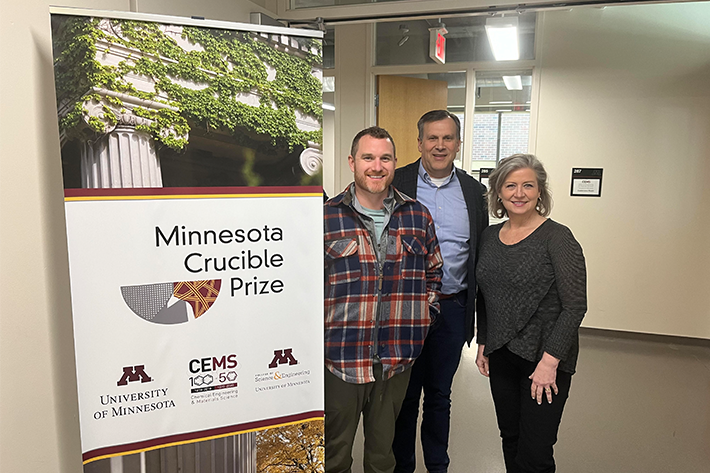2024 Minnesota Crucible Prize Results

Congratulations to the winners of the 2024 Minnesota Crucible Prize, sponsored by Navjot Singh (PhD ChE ’94) and Nithya Iyer Singh (MS Pharmaceutics ’94). The Minnesota Crucible Prize competition invited participants to present a 10-minute pitch followed by five minutes of Q&A to a panel of two commercialization experts. The top three teams were awarded prizes of $2,000, $500, and $250.
This year's winner is CEMS graduate student Emmanuel Onuoha with his pitch for "Renewable Ammonia Production," which enables the production of ammonia onsite at a small scale with zero carbon emissions.
Congratulations to all the finalists. Below are listed the top 3 teams along with an honorable mention.
1st Place: Emmanuel Onuoha with "Renewable Ammonia Production"
"Our product technology enables the production of ammonia onsite at small scale with zero carbon emissions. Due to a growing global demand for food and clean energy, this alternative path to ammonia production is unique and better suited for sustainable synthesis of this important chemical for farmers for onsite fertilizer and fuel, as well as onsite renewable energy storage and production for industrial or housing complexes. Our technology utilizes renewables like wind or solar resources for energy supply while water and air will serve as sources for raw materials for our process. This method is preferred because it does not contribute to greenhouse gas emissions and has a higher energy and cost efficiency compared with traditional processes for making this commodity chemical. It can also be deployed at the site of demand, which is an additional advantage as it eliminates transportation costs for the end user. For example, this process can be installed on a farm or owned by an apartment complex."
2nd Place: Colin Wadsworth, Yukai Shi, and Jayamathangi Srinivasan with "SSW Advanced Films & Coatings"
The technology that we aim to commercialize is “Environmentally-friendly, enzymatic anti-corrosion and anti-fouling coating”. Resistance to corrosion, stains and bacteria is a topic of common interest in both industry and medical fields. Among them, bacteria are our worst enemies: For steel structures that are submerged underwater, bacteria can form biofilms that greatly accelerate the corrosion. In healthcare, pathogenic bacteria can attach to contaminated surfaces or medical devices, leading to infections. Currently, commonly used anti-fouling and antimicrobial coatings include heavy metals (e.g., Cu, Ag), or bactericidal compounds. However, they are all toxic and have an impact on the environment. Therefore, our company aims to commercialize an enzyme-based, eco-friendly, anti-fouling coating. This coating consists of the engineered version of an enzyme called lactonase, which degrades an essential molecule secreted by bacteria for biofilm formation. This technology can be used not only as coatings in major components of infrastructure prone to bio-corrosion, but also as an antimicrobial agent or cleaner in daily life.
3rd Place: Aratrika Ghose with "On Track"
Our easy-to-use, fast-setting material takes less than 30 minutes to dry up on a day that’s 55 degrees or higher, resulting in shorter traffic diversions and closure for repair work. It has also been tested to last twice as long as ordinary patches. Our formula uses tactonite tailings, which is a mining pollutant currently disposed of in large waterbodies. As a result, it can be obtained at low prices and is completely free of cement, which contributes to ~ 8% of global greenhouse gas emissions. Over 40% of America’s roads are in poor or mediocre condition and the current backlog for road repair is estimated to be $485B. The average motorist pays $1000/yr in wasted time and fuel. Rising temperatures are estimated to add $19B/year to pavement costs by 2040. We want to address this growing concern by offering a cost-effective and sustainable solution to bring us back “On Track” to drive towards a greener future.
Honorable mention: Ayaka Moriyama, Krista Hauseman, and Ananya Sahu with "AKA Innovation"
Cooking traditional meat comes with concerns regarding food safety, perishability, and intensive meal preparation. Our company aims to commercialize ReadyGo Crumbles—an instant, plant-based protein packet that can be rehydrated to resemble ground meat and flavored to create a quick, easy meal. ReadyGo Crumbles comes in a package containing textured pea protein, along with flavoring packets containing sauces and/or spice blends. Textured pea protein (TPP) can be manufactured via extrusion, and subsequent rehydration imparts texture and chew to the protein, allowing for “crumbles” with the shape and appearance of ground beef and pork. ReadyGo Crumbles will be sold in its dry form, and consumers can add hot water and the accompanying flavor packet to prepare a protein dish in approximately five minutes, without the need for any cooking facilities or tools. The final protein dish can be eaten alone, or combined with any carbohydrate or vegetable, for a more complete, balanced meal. Compared with traditional meats, ReadyGo Crumbles is shelf-stable and easy to prepare, minimizing the time and effort needed to cook meals. Further, this product is sustainable, reducing the carbon footprint associated with meat consumption, and eliminating issues associated with meat storage and safety. Given that our primary value proposition is convenience, we aim to market towards busy college students, commuters, and adults on-the-go.